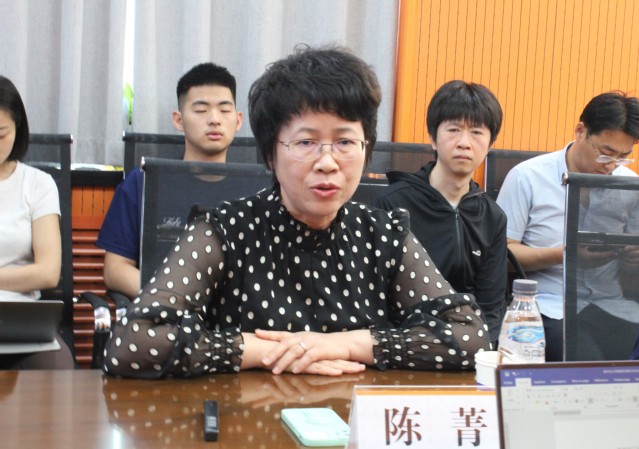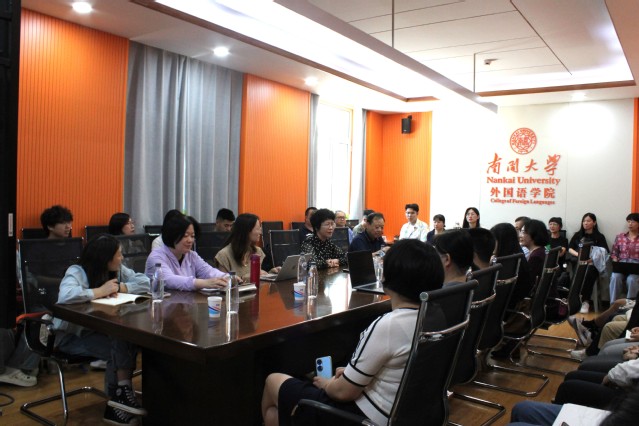
With the acceleration of globalization and the rapid development of information technology, the industry of interpretation has come into an important period of change. In this context, it is particularly important to plan the development strategy of interpretation education and promote the innovation of the education model. On the morning of May 31st, 2024, Professor Chen Jing, member of the China National Committee for Graduate Education of Translation and Interpreting and Dean of the College of Foreign Languages and Cultures, Xiamen University, gave an academic lecture entitled "Seeking the Potential and Changing Interpreting Education in the New Era" at the School of Foreign Studies at Nankai University. The lecture was presided over by Professor Yan Guodong, Dean of theSchool of Foreign Studies of Nankai University, and attended by more than 30 teachers and students, including Vice President Professor Ma Hongqi, Professor Miao Ju and Professor Zhang Zhizhong.
Professor Chen Jing started with the global market demand and analyzed the industry reports from the forefront. Since 2014, the development of information technology has already triggered a discussion about whether translation will be replaced. On the basis of interpreting the Report on the Development of Translation and Language Services Industry in China and the Report on the Investigation of ALC 2023 Language Industry, Professor Chen Jing emphasized that manual translation and interpretation are the scarcest abilities, and interpreters are still one of the scarcest talents in the market.
Based on the high demand in the global market, Professor Chen Jing further pointed out that interpretation education meets the national strategic needs and is an important content in the training of international communication talents. From the perspective of national strategic needs, international communication ability is an important embodiment of national soft power, and foreign language communication talents and interpreters are the key force to ensure the effect of international communication.
Prof. Chen Jing emphasized that cultivating talents needs to pay attention to the development of interpretation ecology. At present, the development of interpreting is undergoing a transformation from the cultivating period to the period of seeking change. During such a critical period, it is necessary to pay attention to the cultivation of interpreters' high-end competence, educational informatization, professional competence and cross-cultural communication ability. Interpretation major teachers and students need to recognize their changing roles and the new demands placed on them by the changing environment.
Facing changes, how to effectively train interpreters? How to cultivate interpreting talents that meet the national needs? Professor Chen Jing proposes that information technology and other resources should be fully utilized to help talent cultivation, talent assessment and talent use, with the goal of realizing the demand traction of interpreting talent cultivation and promoting the matching between classroom and workplace, discipline and industry, talent cultivation and talent use. At the same time, teachers should pay attention to market dynamics, emphasize new competence training contents, and focus on cultivating remote interpreting training ability.
Finally, Professor Chen Jing looks forward to the future of interpretation education and puts forward four core goals: information literacy, high-end ability, professional competence and cross-cultural ability. Professor Chen Jing pointed out that the ultimate goal of improving students' translation ability is to enhance their professional competence, which is the core ability to help students do all kinds of jobs.
During the question-and-answer session of the lecture, teachers and students actively participated in and asked questions, shared the changes in the industry that they had experienced in their interpretation practice, and courageously demonstrated the practical experience they had accumulated in facing the challenges brought by information technology.

Interpretation education in the new era is facing new challenges and opportunities. How to seek development in the midst of change will determine the direction and quality of future interpreter training. This lecture is rich in content and profound in connotation. Professor Chen Jing's in-depth explanation provided valuable information for teachers and students, not only pointing out the way for students of interpretation major, but also pointing out the direction for teachers and students in the whole college to understand the development of interpreting education in the future.



